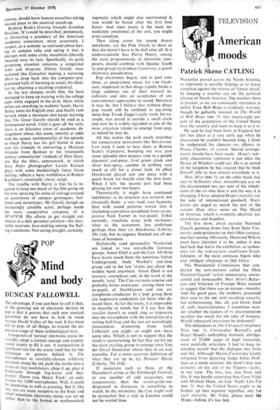POP
Mind and body
DUNCAN FALLOWELL
The advantage, if you can bear to call it that, of the growing use of electronic devices in pop is that it proves that such new musical quantities do not have to lurk in some strange Death Valley of the soul. It has been left to pop, of all-things, to extend the ex- pressive range of these technological toys. Composers of 'serious' electronic music in- variably adopt a formal concept and employ sound simply to fill it out. A composition is significant not for the music itself but for the technique or gesture behind it. Fix microphones at carefully-chosen arbitrary positions along the N.14, push the intake into a series of ring modulators, chop it up, play it backwards through fog-horns and hey- presto! Damn you, Henry Ford: an anti- climax for 3,000 microphones. Well, it could be interesting as well as amusing. But if, like me, you are more receptive to the body and mind sensations electronic music can set up rather than to th4 formal or mathematical ingenuity which might also recommend it, you would be bored after the first four hours. And since music is the most im- mediately emotional of the arts, you might even complain.
Then along come the young dream merchants, say the Pink Floyd, to show us that din doesn't have to be dull after all. It is understandable that Pierre Henry, among the most programmatic of electronic com- posers, should combine with Spooky Tooth (a pop group) to produce Ceremony, a quasi- electronic pseudo-mass.
Pop electronics began, and in part con- tinue, as programme music for LSD freak- outs, important in that drugs rapidly broke a large audience out of their musical in- cubators and into an acceptance of un- conventional approaches to sound. Heretical it may be, but I believe that without drugs pop would still be confined to jog-along teeny-bop. Frank Zappa's early work, for ex- ample, was jeered at outside a small circle and now he is widely regarded as one of the most articulate talents to emerge from pop, as indeed he may be.
All this makes the path much smoother for comparative newcomers like Hawkwind. Last week I went to hear them at Ronnie Scott's (Upstairs), bumping my way past some splendid idiot dancers (one in a purple diamante cod-piece, livid green cloak and silver hair-spray, another in nothing very much at all) for a closer look. In effect Hawkwind played just one piece with a quick break for breath after the first hour. When I left, the second part had been playing for over two hours.
Theoretically it might have continued indefinitely as its structure was textural, not classically finite: a very loud, very hypnotic beat with sound patterns woven into it (including convulsive saxophone from an im- passive Nick Turner in war-paint). Tribal certainly, ritualistic even, with we-know- what as the sacrament, less ambitious perhaps than their LP, Hawkwind (Liberty, 39s I Id), but its urgency blocked out all no- tions of boredom.
Stylistically (and personally) T-lawkwind are linked to two remarkable German groups, Amon Diifil it and the Can. All three have learnt much from the notorious Velvet Underground, Andy Warhol's one-time group and in the late 'sixties just about the wildest band anywhere. Amon Diiiil it are massive, amorphous and, in the word of the month, 'total.' The Can are more concise and probably better musicians: among them two. ex-pupils of Stockhausen and one ex- symphonic conductor. In a 'pop- group these are impressive credentials for those who de- mand them. As for the music, it is impossible to describe in words but if I say that the vocalist doesn't so much sing as imprecate into the microphone with the conviction of a rutting bull-frog and the rest act accordingly (tremendous drumming from Jacki Liebezeit) you might—or might not—have some idea. Which is not to suggest that the result is uninteresting. In fact they are for me the most exciting group to emerge since Van der Graaf Generator whom they in no way resemble. For a more accurate definition of what they are up to, try Monster Movie (Liberty, 39s 11d).
If musicians such as these, or the Dusseldorf artists at the Edinburgh Festival, or any number of odd magazines, are symptomatic, then the avant-garde/un- derground in Germany is something to watch. In the meantime, the Can might well be persuaded that a visit to London would not be wasted time.






































 Previous page
Previous page